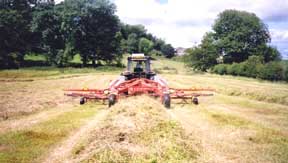|
FAIR
TRADE FOR UK FARMERS & Supporting Prince Charles
|
On
8 February 2006, Sovereignty was interviewed
by Green Futures, the magazine of Forum
for the Future, on the concept of Fair Trade for UK
Farmers. The following is the notes prepared by Alistair
McConnachie which appeared as an article in the
February 2006 issue of Sovereignty.
Pictures: Contractor
rowing and baling the silage at the McConnachie family
farm, South West Scotland, July 2005.
|
 |
WHAT IS "FAIR
TRADE"
The seven principles of the "Fair
Trade" concept -- which relates traditionally to trading with
the developing world -- are:
1. Fair Wages,
2. Co-operative Workplaces,
3. Consumer Education,
4. Environmental Sustainability,
5. Financial and Technical Support,
6. Respect for Cultural Identity,
7. and Public Accountability. |
|
Africa Starves Because of
MARXIST
RACIST Genocide - Against White Farmers
Clink The Link Below For Some Sickening
PHOTOGRAPHS
Give NOTHING
to African Famine Relief
NOTHING ! - NOTHING
! - NOTHING !
|
|
The essence of the concept, however, is the payment
of a "fair price" which ensures economic sustainability
for both the producers and retailers, working together within
a long-term mutually beneficial relationship, enabling both
to plan ahead in economic security.
LOCATING THE CONCEPT IN A BRITISH
CONTEXT
How can that concept be translated into a UK context?
Clearly there are considerable economic, social and cultural
differences between the context of struggling farmers and
poverty in the developing world, compared with struggling
farmers and levels of rural poverty as they exist in the
UK.
Therefore, it would be inaccurate to
make a direct comparison.
However, if we locate the plight of British agriculture
within the context of economic globalisation worldwide,
then we can understand that many of the same economic
dynamics are operating in this country, as operate in the
rest of the world, even though the surrounding circumstances
and consequences may be different.
The dominating economic concept underlying globalisation
is one of "international competitiveness and efficiency"
regardless of how socially or environmentally damaging this
may be.
| For example,
as a result of economic globalisation, we have the worldwide
phenomena of more and more farmers being driven off
the land. We have the dominance of large corporations
in the food chain, who are able to dictate terms. We
have ownership of land passing into fewer and fewer
hands. We have more and more unnecessary trade, where
we import goods we could produce ourselves, or export
to countries who could do the same. |
 |
This is the inevitable result of the economic model of
globalisation, and in response to that we advocate economic
localisation -- which means discriminating in favour
of, and orientating the economic system towards, local and
national needs and markets.
Fair Trade for UK Farmers would be part of that localising
process.
Sovereignty encourages the NFU to explore and
promote Fair Trade for UK Farmers -- and we suggest that
if they did so then they would tap into a considerable amount
of latent support among the public.
There are three things which the NFU must do if it is to
make maximum gains from this idea.
THREE THINGS THE NFU MUST DO
1 -- The NFU must see Fair Trade as part of a wider programme
of localising policies
It would be a mistake for the NFU to see Fair Trade as just
a temporary, fashionable bandwagon upon which they could
jump, and which might offer a quick, short-term way of helping
a few members to make some money.
Rather Fair Trade as a policy should be embraced within
a much wider programme of localising policies.
2 -- The NFU must change its fundamental economic concepts
and its globalising rhetoric
A lot of what the NFU says, economically, is responsible
for the demise of British farming. It emphasises "international
competitiveness and efficiency" and seems to suggest that
if its members don't become "efficient" then they should
go to the wall. The results of that globalising mentality
are all around us.
So the NFU will have to learn that it will not be able
to talk "Fair Trade localisation" out of one side of its
mouth and out of the other talk about British farmers "becoming
more efficient in order to survive in the global market
place" and other mantras which will inevitably mean that
British farming goes under.
The reality is that British farmers cannot compete with
the international market. For example, how can a Scottish
sheep farmer in the midst of a bitter winter compete with
a New Zealand farmer who can ranch his sheep in mild weather
all year?
If it embraces the concept of Fair Trade then it will have
to change its fundamental ideas from globalisation, to
localisation and national food sovereignty.
3 -- The NFU must frame Fair Trade as Economic Justice
It would be wrong if it framed Fair Trade as some kind of
appeal to charity. British farming is not a charity,
it is an essential part of our country.
The Fair Trade movement taps into people's sense of economic
justice. People buy Fair Trade because they want
to do what is right for the developing world and
they want to support a fair and just economic system.
The same dynamic could easily apply towards British produce.
It would reflect an attitude to living, to politics even,
which locates British farming and growing within a wider
national and global context, where the consumer is keen
to do what is economically just, and where the consumer
is able to use ethical purchasing as a direct means of challenging
economic globalisation.
Fair Trade in the UK needs to be framed in that positive,
visionary, revolutionary sense, located within the wider
struggle against globalisation and for economic and
food sovereignty.
Ethical purchasing is part of a revolutionary attitude
towards life which is seeking to create, to build, to
bring forth, to give life to a positive vision of a localised
economic world which stands as an alternative to the
faceless and economic imperialistic globalisation
of today.
This is an attitude to life which is about growing and
building, not about dying and collapsing.
|
This is a struggle which is not about compassion,
but about solidarity,
not about charity but about justice.
Imagine an NFU which made a stand
for economic localisation and for food sovereignty
nationally and globally, and based all its philosophy
and policies upon those two legs.
|
 |
It would be very attractive across the political and social
spectrum and it could be a leader in social, economic and
cultural change for the better. It could have huge appeal.
It is uniquely suited to lead debate in this area.
It needs to embrace the concept
of Fair Trade for UK Farmers.
Fairtrade Fortnight was on 6-19 March
2006 http://www.fairtrade.org.uk/
SUPPORTING
PRINCE CHARLES
is a necessary tactic for those who oppose the establishment
of the corporate dominated, anti-democratic EU-Empire,
says Mike Stagman This article appeared originally
in the August 2005 issue of Sovereignty. Picture: Prince
Charles is carried through the streets of Ashbourne,
Derbyshire on 5 March 2003 before starting the annual
Shrovetide football match between the "up'ards" and
the "down'ards". The 8 hour game has been played annually
since the 15th century. |
 |
If you were one of the pioneering
and foremost environmentalists in the UK and if you had
condemned "the horrifying effects of pollution in all its
cancerous forms"
If you, over a period of 20
years, criticised the most powerful corporate interests
in Britain, and criticised the Governments and, implicitly,
major political parties which tolerate and promote environmental
pollution, and receive financial support from corporate
interests...
If you had, in a royal capacity,
created a flourishing organic farming estate while condemning
chemical pollution of agriculture and if you repeatedly
censured GM food and crops...
If you denounced air pollution,
thus censuring the almighty oil and chemical industries...
If you had outraged the pharmaceutical
industry -- which is part of the enormously powerful chemical-drug-biotechnology
industrial syndicate -- and organised medicine by criticising
the toxic-drug-side-effects culture and speaking out in
favour of holistic and complementary approaches to health
care…
If you, as Prince of Wales,
instead of acquiescing in the evils perpetrated by economic
and political powers by placing a gloss of glamour over
pernicious proceedings -- if you instead had shown a strong
moral conscience and acted forthrightly to condemn powers-that-be
and fight for social and environmental justice, supporting
in different ways the poor, the disadvantaged, and Nature,
which is helpless against corporate onslaught...
If you, unlike a string of
treacherous Prime Ministers, opposed British subjugation
in the corporate-dominated, dictatorial European Union empire…
If you were the Prince of
Wales, with the above track record, and were receiving enthusiastic
popular approval for many of these stands, would you
not be certain to receive the unwelcome attentions of the
vested corporate interests that you have criticised and
continue to threaten?
And if you were
to become King!
Remember how Claudius feared the popular Prince Hamlet!
What, therefore, should one expect
from vested interests?
Answer: a smear campaign against the Prince to poison the
minds of the Public, best executed by a scurrilous tabloid
press.
And that's what we've seen.
Charles has been mocked and misrepresented and slandered
in a campaign that has lasted two decades. His private life
has been maliciously gossiped, smeared with falsehoods and
sensationalised to get at him for ulterior reasons.
Backed by corporate and political powers, and exploiting
the Prince's own sense of dignity, the tabloids have libelled
Charles repeatedly, secure from the lawsuits which are their
due.
In short, libellous gossip in tabloid smear has been the
deliberate, cynical policy of vested economic and political
interests. They fear a populist prince. Every slight, mock
and defamation testifies to that fact.
And now, the New
Labour Government has openly and persistently attacked
Prince Charles and the Monarchy by pouring over their finances
to find every missing penny -- see for example the article
in Sovereignty, July 2005.
Why?
Because the New
Labour Government wants to eliminate the ability of Queen
Elizabeth and Prince Charles to defend British democracy
and age-old liberties.
The Government views the Monarchy -- especially Charles
but potentially Elizabeth also -- as an enemy to its ambitions
of surrendering the United Kingdom to the corrupt, dictatorial,
corporation-dominated EU empire.
And it is not just me that is saying that: See for example,
Simon Heffer's article, "Welcome to the Republic of Tonyland",
where he says, "Blair wants to destroy the Monarch's role
as one of the checks on his power in order that he can do
whatever he likes" (The Daily Mail, 6 March 2004).
The New Labour Government has thus:
= Launched an "inquiry" into so-called possible
waste on royal estates, an obvious attempt to smear and
intimidate the Monarchy, and my own Swansea MP, the New
Labour henchman Alun Williams, has foghorned so-called "grotesque"
spending by the Prince.
= In an outright police-state action, plans for
a British "FBI" include obedience only to Government ministers,
not the Crown, which represents the People and Democracy.
This breaks a 175-year-old tradition (see Daily Mail, 18-12-04).
= Shown disrespect to the Queen by having the Lord
Chancellor turn his back on her when returning to his seat
at the State Opening of Parliament.
There are ways in which we can show our support for the
Monarchy and protect the Nation from being treacherously
lost to the corrupt, dictatorial EU-empire.
If we want to demonstrate our support for Prince Charles
against the New Labour anti-Monarchists, I suggest the following
when Prince Charles makes a public statement with which
one is in agreement:
1. Write Prince Charles at Clarence House, St James's, London,
SW1A 1BA or Queen Elizabeth.
2. Spread the word. Communicate with others about this
-- family, friends, associates. Copy this article and
other useful material and circulate it. Distribute good
articles via email.
3. Write to the Media -- local, regional, national. For
those with email access, it's never been easier and it
need not be more than a couple of paragraphs -- include
your address and phone number.
4. Call/write your MP -- whatever the political topic
may be.
A good way is to form small delegations of 2, 3, or 4
persons, make an appointment with the MP's assistant,
and go visit him or her. If you find that he or she is
not obliging and part of the problem, publicise it and
let them know it!
If more British citizens participated in public affairs
we could rescue our political system -- which is rightly
ours -- from being the playground of Monied Interests and
their political puppets.
"The Prince of Wales has suggested that he would
not be concerned if Britain withdrew from the European Union.
The Prince revealed his views when he met Lord Haskins,
a businessman admired by Tony Blair who is the Government's
Rural Recovery Co-ordinator, to discuss the future of farming.
When Lord Haskins argued that EU trade regulations meant
that the logical conclusion of the Prince's pro-organic
views would be the withdrawal of Britain from the European
Union, the Prince said: 'So?'"
|